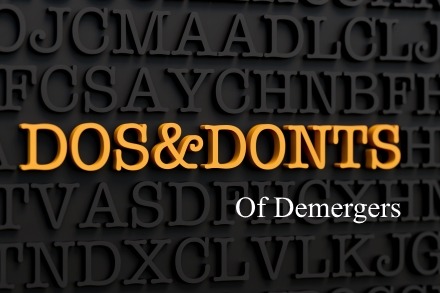Craig Simpson, Tax Partner at Bates Weston has been looking at the “dos and don’ts” of demergers.
We have been implementing demerger transactions for many years and in that time have experienced a multitude of different scenarios all with their own challenges. We act for clients directly and other firms of accountants. We love a good demerger!
If you want to know more about the different types of demerger transactions and case studies these can be found here.
Getting right to the point, demergers are complicated in terms of tax technical input and costly to implement in terms of professional fees. That said, the fees should be significantly lower than the tax at stake otherwise commercially there doesn’t seem much point. You can also obtain prior HMRC clearance for the whole transaction, so provided you actually do all the steps that you told HMRC you were going to do, you should not be taking any tax risk.
So what are the dos and don’ts of demergers? What should you aim to do and not do?
The Dos of Demergers
- Assemble a suitably qualified and experienced set of advisors:
- Tax advisors with accounting experience
- Corporate Lawyers used to dealing with demergers and reconstructions
- Banking and financial services support where appropriate.
- One for the professionals and clients alike: agree a scope of work and fees for the project – then there are no surprises later.
- Understand the client’s commercial requirements. It can be all too easy to lose sight of the commercial objective of the whole transaction in the quest for a great tax outcome.
- Debug the potential structure. Is it even possible? What are the alternatives? Does the accounting and tax work?
- Prepare a steps plan breaking down all the steps in detail. Get input from the lawyers to make sure they can plan the required legal documents. Speak with the bankers where security or asset cover is important for lending.
- Look at the operational aspects of what is being proposed. Are operational licences needed? Can equipment be moved? Is there a change of control clause in supplier contracts that needs to be considered.
- Apply for HMRC clearance. See our article on HMRC clearances
- Implement the transactions carefully. HMRC clearance does not confirm the tax reliefs apply (that is a myth). The HMRC clearance is only confirming that the anti-avoidance legislation will not be applied to the transaction – it is not confirming the complete tax position and so if you miss a taxable transaction the HMRC clearance will not help you. That’s why the expert tax advice is needed and why it must be implemented correctly (using good lawyers) to ensure the tax reliefs apply.
The Don’ts of Demergers
- Do it on the cheap. A demerger is likely to cost in total between £40,000 and £75,000 in professional fees. Prepare yourself for this, although the tax saving should be significantly more. However, using inexperienced advisors may well cost a lot more in the longer term. If the plan is to sell part of the business then the demerger needs to stand up well to a due diligence process. You also want to ensure that the tax reliefs actually apply.
- Underestimate the value of the assets being moved. We have seen many occasions where clients have felt that a full demerger has not been necessary as they have convinced themselves that the assets are not actually standing at much of a gain – only to find out later that HMRC do not agree and are facing a huge tax liability which a demerger would have avoided. This is particularly an issue where a business is being demerged with an unknown amount of goodwill attached to it.
- Rush; Demergers are somewhat of an art! They are enjoyable and head scratching at times. Don’t make it stressful, and get a second opinion if you are not sure as you only get one go at it.
If you would like to discuss your circumstances then please do get in touch with Craig Simpson.
This guidance is generic in nature and does not constitute advice. You should take no action based upon it without consulting ourselves or your own professional advisor.
Related articles:

